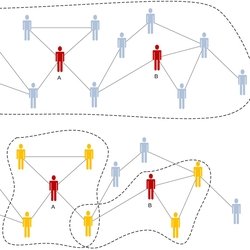Promoting Co-operation
How can we promote cooperation in human cooperation?
How to best govern society and promote cooperation is a centuries-old debate: is cooperation best maintained by a central authority, or is it better handled by more decentralized forms of governance? Using mathematical models, we explore the tradeoffs between different mechanisms for cooperation. We studied how centralized cooperation-enforcement mechanisms may be undermined by corruption, and how decentralized enforcement can provide viable alternatives. We also showed that it is possible to promote cooperation by inducing peer-pressure in social networks, using interventions that amplify the power of peer enforcement mechanisms.
Scientific writings
Sarkadi, Ş., Rutherford, A., McBurney, P., Parsons, S., & Rahwan, I. (2021). The evolution of deception. Royal Society Open Science, 8(9), 201032.
A. Mani, I. Rahwan, and A. Pentland (2013). Inducing Peer Pressure to Promote Cooperation. Scientific Reports. 3(1735) doi:10.1038/srep01735.
S. Abdallah, R. Sayed, I. Rahwan, B. LeVeck, M. Cebrian, A. Rutherford, J. Fowler (2014). Corruption Drives the Emergence of Civil Society. Journal of the Royal Society Interface. 11(93).
[Selected Media: Anti-Corruption Research Network (part of Transparency International)]
